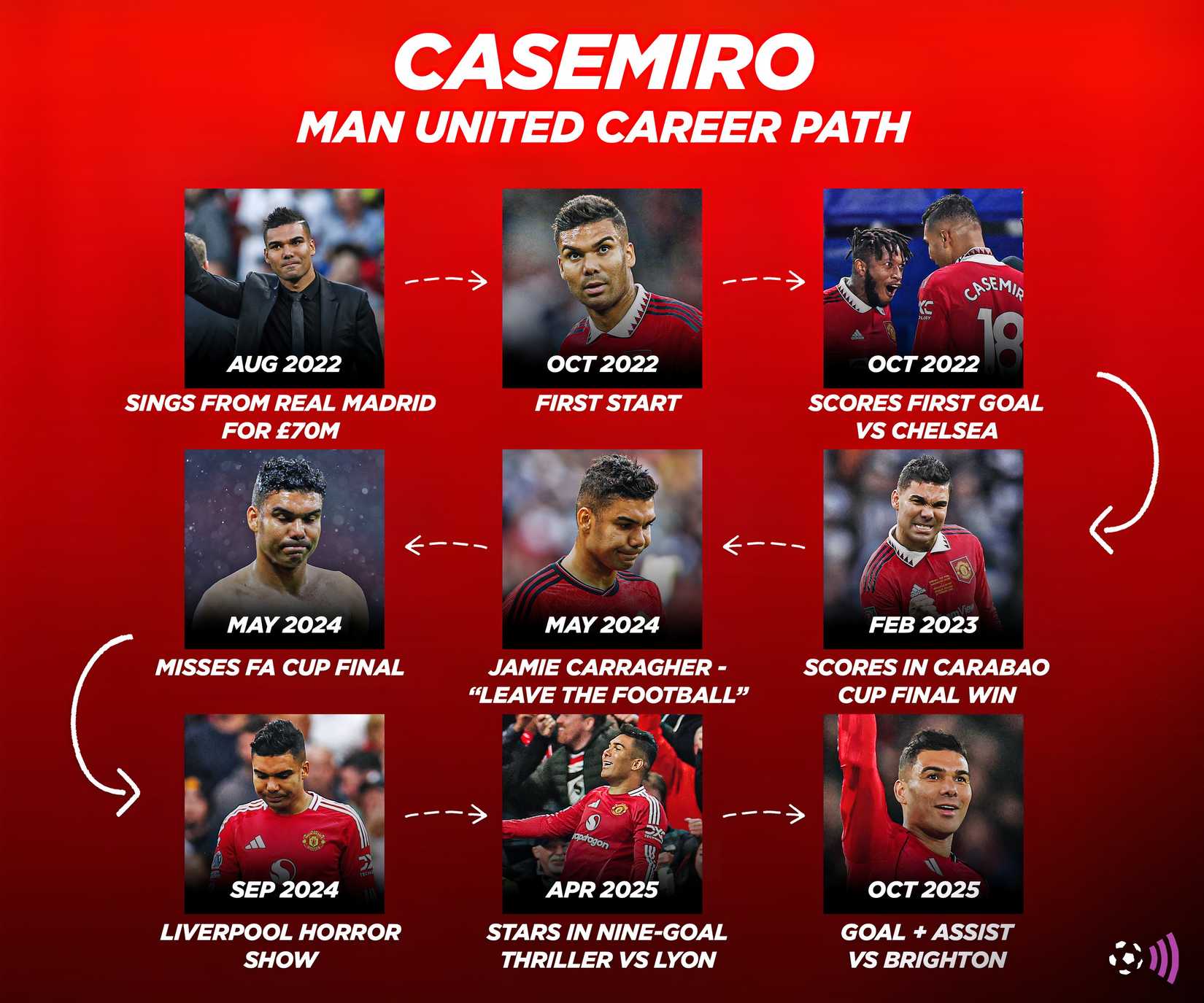Sports
Forgotten gem who’s “like two men” can end Casemiro & Ugarte’s Man Utd stay

More than any other location, Wembley perhaps marks the turbulent nature of Casemiro‘s Manchester United stay best.
Indeed, in February 2023, United’s emerging talisman nodded home the opener as Erik ten Hag’s side went on to claim Carabao Cup glory, with the Brazilian proving to be the “cement” in the team that season, in the view of his manager.
Roughly 15 months later, however, and the ex-Real Madrid man merely watched on as the Red Devils shocked Manchester City to win the FA Cup, with the much-maligned Sofyan Amrabat acting as the midfield pillar on the day.
Confusion remains over just why Casemiro was absent, having initially been included in the matchday squad, before pulling out due to a reported tight hamstring.
Was he merely perturbed by being axed for Amrabat, or was there a genuine issue? Either way, that day – like the debacle at Selhurst Park a few weeks earlier – appeared to mark the beginning of the end for the veteran’s Old Trafford career.
|
2024 FA Cup Final – Starting XI |
|
|---|---|
|
Position |
Player |
|
GK |
Andre Onana** |
|
RB |
Aaron Wan-Bissaka |
|
CB |
Raphael Varane |
|
CB |
Lisandro Martinez* |
|
LB |
Diogo Dalot* |
|
DM |
Sofyan Ambrat |
|
DM |
Kobbie Mainoo* |
|
RW |
Alejandro Garnacho |
|
LW |
Marcus Rashford |
|
CF |
Bruno Fernandes (C)* |
|
CF |
Scott McTominay |
|
*Still at the club |
|
|
** out on loan |
|
Remarkably, with 2026 looming, the 33-year-old has defied the odds to recapture his starting berth under the Ruben Amorim regime, even if his long-term future remains murky.
Why Man Utd still need to let resurgent Casemiro leave
Had his legs given up on him, or did the midfielder merely give up on Ten Hag, with the five-time Champions League winner looking so out of sorts when deployed as a makeshift centre-back in that 4-0 defeat to Crystal Palace.
With Amorim in the door, the ageing talent has looked like a different player, it must be said, with the Portuguese coach among those seemingly surprised at the manner of his resurgence.
While Casemiro did start alongside Christian Eriksen for Amorim’s first game at Portman Road, he initially faded from view, having been “behind every midfielder, even Toby [Collyer]” at one stage, according to his manager.
A firm fixture of last season’s Europa League run, the £70m signing has since started 13 Premier League games in 2025/26, scoring key goals against Chelsea, Brighton and Nottingham Forest.
He is a man on the rise, but should that cloud the judgment of Amorim and INEOS? A player whom Sir Jim Ratcliffe pointed to as a problematic signing, prior to his arrival at Old Trafford, there must surely be a willingness to get such an expensive asset off the books.
On a reported £350k-per-week, it is difficult to see the merit in extending Casemiro’s deal, with just six months left to run on his current contract.
The suggestion is that INEOS will indeed look to let him leave for nothing, and for all his recent uptick, that should seemingly be the correct course of action, not least considering the midfield warrior will turn 34 in February.
That process of transitioning Casemiro out of the side could be made far easier too if Amorim looks to a forgotten United figure – and no, it’s not Manuel Ugarte.
Man Utd’s forgotten star can replace Ugarte & Casemiro
Upon his move to Manchester in the summer of 2024, there was a sense that Ugarte would be the ready-made Casemiro replacement, emerging as something of a tackling machine during his stint at Sporting CP, albeit less so at Paris Saint-Germain.
18 months later, while he does still rank in the top 1% of midfielders in Europe’s top five leagues for tackles made per 90, as per FBref, the Uruguayan has drifted into the periphery, starting just two league games all season.
The subject of criticism from his manager at the end of last term, the 24-year-old is staring down the barrel of his own swift exit heading into 2026, amid reports he too could be let go either in January or next summer.
Again, the decision to allow him to leave in the New Year could be made far easier if Amorim does decide to reintegrate the aforementioned Collyer, with there a debate to be had over recalling the Englishman from his spell on loan at West Bromwich Albion.
Currently back in Manchester receiving treatment for a fresh injury, which could keep the 21-year-old sidelined for eight weeks, there could be merit in keeping the former Brighton and Hove Albion man on board when he is back to full fitness, not least considering the lack of midfield depth at Amorim’s disposal.
The player whom Ten Hag made a beeline for during those FA Cup final celebrations, as he had done with Kobbie Mainoo in the Carabao Cup a year earlier, Collyer went on to make 13 first-team appearances last term, following his debut off the bench in the Community Shield loss to Man City.
Now, he may not be the glamorous, Mainoo-style ball player that United are also in need of, but what he does possess is a real engine and work ethic, with such athleticism distinctly lacking from the experienced pairing of Casemiro and Bruno Fernandes.
Indeed, in the view of his former Brighton coach Mark Beard, he almost “plays like two men sometimes“, such is the ground he can cover, having been hailed as arguably the “best in the country” in that department at his age group.
Also noted as being “like a Kante” by Beard, Collyer showed flashes of that defensive nous last season, memorably producing a remarkable goalline clearance against Fulham at Craven Cottage.
Of course, it hasn’t been a fruitful loan spell due to injury and a lack of game time, after starting just three Championship games for the Baggies, although when fit and available again, the two-footed talent could be deserving of a chance to stake his claim back in Amorim’s first-team set-up.
Ugarte, among the worst signings of modern times, just isn’t cutting it, while Casemiro is surely heading toward the climax of his United stay.
Collyer, albeit while a wildcard option, might just represent the perfect replacement to help nudge them out the door.

Best signing since Bruno: Man Utd star can be Amorim’s “best player” again
Manchester United have another top-level talent on their hands alongside Bruno Fernandes.














